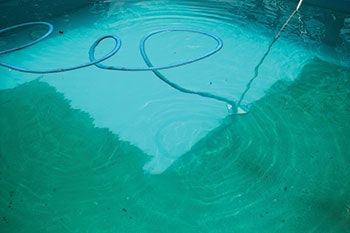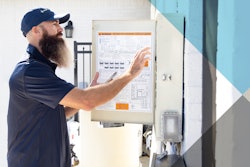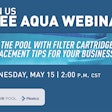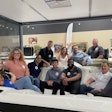
When Internet retailing began over two decades ago, traditional retailers with storefronts and parking lots and cash registers immediately perceived a threat. It has taken time for that threat to reach crisis proportions for smaller, local dealers in the pool and spa industry.
Most people are aware of the vague outlines of the case. Scott Long, a dealer from the bellwether state of Ohio, laid them out as we stood in the aisles of the AC show in late January. “The dealer advertises, builds the pools, delivers and installs the spas, provides the showrooms, warranty support, etc.,” he said, while the Internet retailer bypasses all those expensive and time-consuming tasks and simply takes the order and mails the product, tax-free, to the consumer.
Even more galling to dealers is when the Internet retailer is able to boost this considerable natural advantage with volume pricing from the manufacturer and offer a product to consumers for less money than the traditional dealer’s wholesale cost.
This is an enormous competitive advantage, which, over time, threatens to crush the storefront retailer.
Big Seller
Much of the attention has focused on the automatic pool cleaner due to its growing popularity, especially the robotic cleaners. Traditional dealers have been particularly incensed to lose out on sales of this well-received, time-saving invention to Internet retailers. It’s one thing to watch sales drop in a diminishing market or even a static one, such as filters. It’s quite another to see one of your few gushing revenue streams being diverted into a competitor’s territory.
Jami Pittman is an independent rep who has spent his whole career selling pool cleaners — he started selling Kreepy Kraulies door-to-door in South Florida in 1984 — and he believes robotics are now the fastest growing segment of the automatic pool cleaner market. He has noticed a big push among the big three manufacturers to capture some of that growth.
“Robotic cleaners are joining the list of premium, energy-saving products that a savvy builder uses to sell a pool, along with variable-speed pumps, etc.,” he says. “You can’t sit there and say you’re offering the same old suction or booster cleaner, because a robotic cleaner is just a lot more efficient.”
This general acclaim — the units are popular with consumers and even service people as well due to their convenience — and resulting market demand left dealers such as Wade Fowler hoping for a profit-winning product that could ease the strains of the recession. But it hasn’t worked out as well as he expected.
Fowler is general manager at Falco/Fowler & Sons, a dealership in Texarkana, Texas with more than 50 years in the business. He says the Internet price of an item comes up constantly in his interaction with customers, and for some of them, it’s part of an overall strategy that takes advantage of the dealer’s physical presence and expertise while getting the low, tax-free price from the e-tailer.
“I’ve had incidents where I’ve had customers come in say, ‘Hey Wade, I’m interested in an automatic cleaner.’ And I’ll say, ‘Sure, I’ve got a unit you can demo. We’ll bring it out for 48 hours, let you try it.’
“When we go out and pick it up, they say, ‘Yeah, we loved it, I’ll call you tomorrow after I talk to my wife.’ A week goes by, and I call them up and say, ‘Are you about ready to get that cleaner?’ And they say, ‘Oh, we found a unit at pool.com for less.’
“The buyer doesn’t care, they’re just looking for the cheapest price. This kind of thing is common here in East Texas — very common.”
Why should we care?
Many theorize that larger dealers and chains in densely populated areas will be able to survive growing Internet competition by using their greater clout with manufacturers and focusing on other areas of the pool and spa dealer trade. But Long points out that if the industry loses dealers in smaller towns like New Philadelphia, Ohio, and thousands of others like it, what will replace them? And more importantly, who will serve the pool and spa customers there and promote the industry to new ones? Can an industry struggling to grow afford to lose these dealers?
Long asks a more fundamental question, “If all it takes is a website and a storage room, what does it mean to be a pool dealer? Is there value in that service?”
When these questions are posed to dealers under threat, they often respond that this cut-throat Internet business model is fine for commodities like books and toys. But pools and spas require some expertise and support, and by killing off the source of expertise, you will eventually kill off part of the industry, as pools go unsupported and customers spread tales of frustration to their neighbors who then choose to spend their discretionary dollars in Cancun. Eventually, this will result in an overall drop in pool equipment sales for everyone.
United Front
Some dealers believe the solution to this problem is an organization of retailers that can press their arguments. It’s an extremely difficult enterprise to undertake — the gathering of independent and competitive retailers into a united front. It’s a job that takes enormous amounts of time, while dealers are some of the busiest, most time-starved people in the American economy.
One successful regional group is the Arizona Pool Dealers Association, which has pressed for MAP (Minimum Advertised Pricing — a policy in which both traditional retailers and e-tailers are prohibited from undercutting some minimum price) as a possible solution to the problem.
Bart Mitchell of Litchfield Park Pool Service in Litchfield Park, Ariz., is one of the founders of the AZ dealers group. He believes public statements by his dealer group have gotten the attention of manufacturers, and says other dealers should do the same. “It takes a lot of work to organize dealers,” he says, “but I have received interest from other dealers nationwide.”
Mitchell thinks that while much damage has been done to the traditional retailer’s ability to compete for cleaner sales, the situation has gotten slightly better due to manufacturers more stringent enforcement of MAP.
“I’ve been watching, and Internet pricing is definitely moving up. I think manufacturers are enforcing their programs,” he says.
“The way it has worked is the Internet retailers sell the cleaners below my cost, at very low margin, but then make their money on back-end rebates from the manufacturer or point systems where they get rewards. Well, with the new program they can’t do that as easily.”
Another hope of some retailers is a change in government policy toward the Internet. For years, there has been increasing pressure for the federal government to begin regulating the Internet, and it’s fair to say that the current administration in the White House is more pro-regulation than any in decades. Regulation by its very nature increases overhead and cost, and such burdens would fall on e-tailers who now operate freely with a minimum of constraint.
Perhaps more important is the enormous desire of state governments to tap into the tremendous untaxed commerce of the Internet. Should state sales tax be added to Internet sales price of pool and spa items, the financial equation for consumers to buy online would be altered significantly.
Manufacturers Respond
The cleaner market is as important to manufacturers as it is to retailers, and companies that build automatic pool cleaners have searched for ways to address the concerns of traditional dealers while being fair to their online customers. It’s a fine line, notes Marchal DePasquale, senior vice president of sales and marketing at Smartpool.
“We recognize that we serve two distinctly different retail business models,” he says, “and both of them are trying to attract the same consumer.
“So what Smartpool has done is create different cleaner lines for each business model. One is designed for the Internet retailers and the way they go to market and service cleaners — that cleaner has a different warranty and different features than what the traditional retailers have in their stores. We’re trying to segregate the market so that both of these kinds of retailers will have an equal shot at that same consumer.”
Separate-cleaners-for-separate markets is a concept used by several manufacturers. For instance, Aqua Products has introduced its BMO – Brick and Mortar Only line of products that may not be advertised with any price or price promotion via the web.
“This product line addition gives all brick and mortar outlets the confidence to stock and sell the Aquabot brand knowing that the consumer cannot price shop and deteriorate fair and equitable margins,” says Steven Ferry, vice president of marketing, Aqua Products.
Maytronics also offers different cleaners for its e-tailers and traditional dealers, and if a brick-and-mortar cleaner is sold on the Internet, the warranty is void. Fowler is a fan of this system.
“That gives us mom and pop stores a little something we can work with,” he says. “I’ll demo a unit and somebody will say, ‘Hey, I saw this unit online for this price.’
“And I’ll say, ‘Yes, ma’am, I’m sure you did, but did you also see that if you buy this unit online, you do not have a warranty. And 95 percent of the time I get the sale from that.”
MAP AND LAAP
The most frequently discussed means to even the playing field for dealers is Minimum Advertise Pricing (MAP). This policy, in force at several automatic cleaner companies, seeks to prevent any retailer from selling product below some pre-set base price.
Of course, enforcement is the crucial element of the plan. Manuela Rief, vice president, Poolvergnuegen, says that is the focus of the company’s effort. “We police it as stringently as we can, and we pursue our MAP policy to the utmost. And we have a rewards program and if somebody doesn’t abide by the rules we take it away.”
Zodiac (along with its subsidiary Polaris) refers to this general concept as LAAP, or Lowest Acceptable Advertised Price. This applies to advertisement, as the company points out is has neither influence nor control over the pricing set by dealers.
But Zodiac and Polaris have recently made a significant change in their manufacturer’s rebate structure by redefining consumer rebates to provide higher rebate rewards based on the amount spent. This impacts the cleaner sales dynamic as manufacturer rebates are an important part of the overall financial calculus of the cleaner purchase.
“Under the new ‘Get Rewarded’ tiered rebate schedule,” says Michelle Kenyon, vice president of marketing at Zodiac, “consumers will have the opportunity to earn a larger rebate based on higher net prices paid for cleaners within any of the following categories: suction, pressure or robotic, under both brand names. This program, the largest consumer rebate program in the industry for automatic pool cleaners, will provide a strong incentive for pool owners to purchase the best selling cleaners throughout the 2013 peak pool season and will drive sales for dealers while protecting margins and enhancing brand credibility. Zodiac’s tiered program will provide a compelling enticement to support sales for all dealers across the industry while maintaining the value of Zodiac brands.”
In addition, she adds, “Local pool companies that invest in providing service and education can leverage the tiered rebates in their stores to be more competitive in their local markets. The ‘Get Rewarded’ rebate program pertains to consumers who purchase Polaris and Zodiac branded automatic pool cleaners. We have received great response from our customers on the improvement of an already successful program.”
A Fluid Market In A Fluid Industry
Measures such as MAP and LAAP and segregated cleaner lines are being taken in the midst of an evolving market. With variables in play such as intense dealer interest, manufacturers looking to preserve the goodwill of their various distribution channels and the spectre of regulation, the only certainty is that the situation a year from now will be different than it is now.
“At the end of the day, is what we’re doing perfect? Probably not. Will it be like this next year? Probably not, because it’s such a fluid situation in retailing right now. But we’re doing the best we can to protect our brand and protect our customers’ margins,” says DePasquale.
“I owned retail stores for 15 years, and I know it’s hard. And as a manufacturer I understand the issues. You have these two different business models going to the same consumer. As a manufacturer, we have to come up with strategies that enable both of them to buy from us, while we protect them.”
Comments or thoughts on this article? Please e-mail [email protected].








































